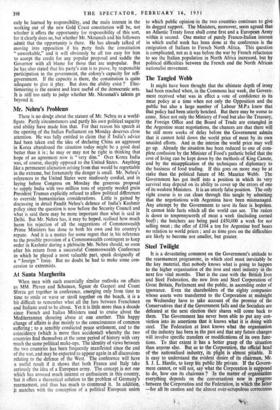Mr. Nehru's Problems
There is no doubt about the stature of Mr. Nehru as a world- figure. Partly circumstances and partly his own political sagacity and ability have made him that. For that reason his speech at the opening of the Indian Parliament on Monday deserves close attention. He was fully entitled to claim that if India's advice had been taken and the idea of declaring China an aggressor in Korea abandoned the situation today might be a good deal better than it is ; he may or may not be right in thinking that hope of an agreement now is "very dim." Over Korea India was, of course, sharply opposed to the United States. Anything like a permanent alienation arising from that would be regrettable in the extreme, but fortunately the danger is small. Mr. Nehru's references to the United States were studiously cordial, and in laying before Congress on Monday the generous proposal to supply India with two million tons of urgently needed grain President Truman explicitly refused to allow political differences to override humanitarian considerations. Little is gained by discussing in detail Pandit Nehru's defence of India's Kashmir policy since the question is now before the Security Council and what is said there may be more important than what is said in Delhi. But Mr. Nehru has, it may be hoped, realised how much harm his rejection of all the suggestions of Commonwealth Prime Ministers has done to both his own and his country's repute. And it is a matter for some regret that in his reference to the possible provision of a Commonwealth contingent to keep order in Kashmir during a plebiscite Mr. Nehru should, so soon after his return from a successful Commonwealth Conference in which he played a most valuable part, speak designedly of a " foreign " force. But no doubt he had to make some con- cession to extremists.


































 Previous page
Previous page